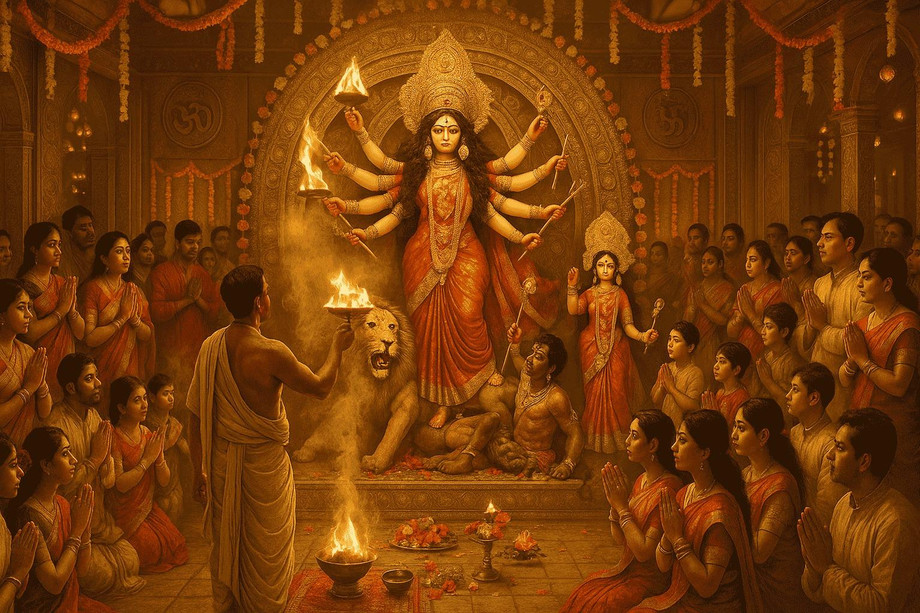The Significance of Durga Maa Pooja and Vishwakarma Jayanti in Indian Culture
India is a land of festivals, each celebrated with great devotion and enthusiasm. Among the many festivals observed across the country, Durga Maa Pooja and Vishwakarma Jayanti hold special significance for millions of people. These festivals reflect the rich cultural heritage of India, showcasing a blend of spirituality, tradition, and community bonding. Every year, people from all walks of life come together to celebrate these auspicious occasions with prayers, rituals, and vibrant festivities.
Durga Maa Pooja is one of the most revered Hindu festivals, especially in eastern India. It celebrates the victory of Goddess Durga over the demon Mahishasura, symbolizing the triumph of good over evil. This festival usually takes place during the month of Ashwin, according to the Hindu lunar calendar. In the middle of these grand celebrations, Durga Maa Pooja holds a special place as devotees set up beautifully decorated pandals, perform elaborate rituals, and offer traditional sweets and flowers to the goddess. The cultural programs, traditional dances, and community feasts make this festival an unforgettable experience, bringing joy and unity among people.
On the other hand, Vishwakarma Jayanti is a unique festival that honors Lord Vishwakarma, the divine architect and craftsman of the universe. Celebrated mostly by artisans, engineers, architects, and industrial workers, this day is dedicated to paying respect to the creator of all tools and machinery. In the midst of workplace gatherings, prayers, and special offerings, Vishwakarma Jayanti serves as a reminder of the importance of hard work, creativity, and precision in one’s professional life. Many industries and workshops shut down on this day as workers worship their tools and machines, seeking blessings for prosperity and safety.
The beauty of Indian festivals lies in the diversity of celebrations across regions. During Durga Maa Pooja, entire neighborhoods come alive with vibrant lights, artistic decorations, and a palpable sense of devotion. Community members, irrespective of their backgrounds, come together to participate in the rituals, cultural events, and processions. The middle of the festivities often features the grand immersion of the goddess’s idol into nearby rivers or lakes, marking the end of the celebrations. This moment symbolizes the transient nature of life and the eternal spirit of the divine.
Similarly, Vishwakarma Jayanti is observed with great reverence in workshops, factories, and construction sites across India. Midway through the day, workers assemble for special poojas, offering flowers, sweets, and lamps to their tools and machines. This act of worship reinforces the belief that tools and technology, though material in nature, possess a divine element that aids human progress. Vishwakarma Jayanti not only strengthens the bond between workers and their profession but also promotes safety practices and mutual respect in the workplace.
Both Durga Maa Pooja and Vishwakarma Jayanti reflect the deeply spiritual and cultural roots of Indian society. While Durga Maa Pooja emphasizes the power of good to overcome evil and the strength of the feminine divine, Vishwakarma Jayanti highlights the significance of skill, craftsmanship, and innovation in daily life. These festivals offer a perfect blend of devotion, community spirit, and cultural pride, making them an essential part of Indian tradition.
In conclusion, the celebration of Durga Maa Pooja and Vishwakarma Jayanti holds immense importance for people across India. These festivals not only provide a platform for religious devotion but also foster social unity and cultural pride. As families come together, rituals are performed, and workplaces observe a day of reverence, the spirit of these festivals strengthens the connection between tradition and modern life. Embracing the essence of these celebrations helps keep alive the vibrant cultural heritage of India, passed down from generations.
- Art
- Causes
- Crafts
- Dance
- Drinks
- Film
- Fitness
- Food
- Jeux
- Gardening
- Health
- Domicile
- Literature
- Music
- Networking
- Autre
- Party
- Religion
- Shopping
- Sports
- Theater
- Wellness




